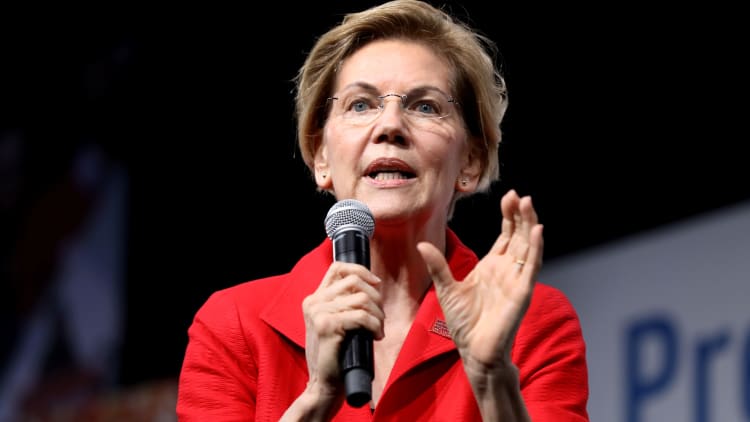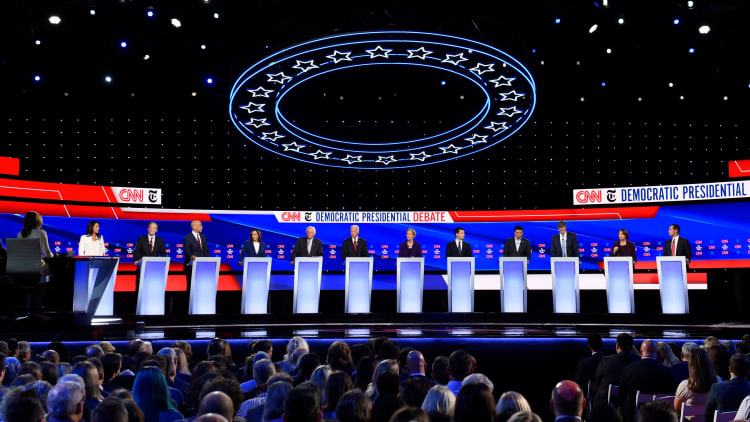News Items assembly begins at around 2:30 am weekday mornings, so I don't watch prime time television, as a rule. My Google robots are hard at work however, gathering the latest news and video clips. They did a nice job capturing the "highlights" of Tuesday's Democratic candidates debate. I then read the next morning's coverage/analysis and then, finally, the transcript of the debate itself.
How anyone came away with the idea that Elizabeth Warren "won" the debate is beyond me. Yes, she was the focus of the others' attacks. Yes, she got the most speaking time. And yes, she's good at getting her points across (and insisting that she be allowed to finish her answers).
But she did not "win" the debate. The debate wounded her and revealed her vulnerability on the issue of Medicare For All. That vulnerability is all-but-perfectly captured here. Dodging the issue of how Medicare For All can realistically be financed isn't tenable, even in the short-term. The longer she dodges the question, the more damage her candidacy sustains.

Compounding the "artful dodger" problem was (and is) a surprising defect of wonkdom. Because she is very smart (whether you agree with her or not, she is very smart), we expect her to be smart about most everything. And she markets brain power and thoughtfulness as a feature of her campaign (she has "a plan for that" is code for "she knows what she's talking about").
On the subject of Medicare For All, however, she appeared not to have done her homework, as Megan McArdle pointed out to devastating effect in this morning's Washington Post. To paraphrase McArdle, it turns out Warren is not a health care wonk, "she just plays one on TV."
Playing expert on TV would be fine if Warren had been skating her way through some gotcha question about the Export-Import Bank. But she wasn't doing that. She was talking about a staggering and unsustainable expansion of Federal spending. Here's The Atlantic's Ron Brownstein:
The Urban Institute, a center-left think tank highly respected among Democrats, is projecting that a plan similar to what Warren and Senator Bernie Sanders are pushing would require $34 trillion in additional federal spending over its first decade in operation. That's more than the federal government's total cost over the coming decade for Social Security, Medicare, and Medicaid combined, according to the most recent Congressional Budget Office projections.
This is not an issue that can be "finessed," although the Warren campaign brain trust is doubtless trying to think of a way to do just that. There is no way.
Which means that Warren, sooner rather than later, is going to have to walk back her support for Medicare For All or propose a massive middle class tax increase to pay for it. Bernie Sanders has been honest about the need for such a tax increase and argues that it will be offset by reduced health care costs (over time). Warren is trying to have it both ways. That gives Joe Biden and Pete Buttigieg and Amy Klobuchar the opportunity to damage her "brand" as policy wonk and, perhaps more important, as a "truth-teller."
There are two brackets in the Democratic presidential nomination campaign. The "activist" or ideological bracket, once owned by Bernie Sanders, is now more Warren than not. You don't have to read the polls to see the shift. It's evident from the crowds Warren attracts around the country. She's the new standard-bearer for the party's formidable left wing.
The other bracket is comprised of candidates who are more "moderate" and advertise their "electability." The argument these candidates make is simple: "Beat Donald Trump first and we'll figure out the rest later." As the president's behavior grows more erratic, the power of this proposition strengthens.

Former Vice President Biden is the presumed favorite in the "electability" bracket, almost entirely because he consistently leads President Trump in most every key state and national poll. Because of past performances (1988 and 2008) and any number of stumbles on the campaign trail, however, many "electability" voters long for a viable alternative. At some level, they want just that. Biden is yesterday's papers. They're hoping someone new (who can defeat Trump) will come along.
The Iowa caucuses and the New Hampshire primary will choose the "electability" alternative to Biden. Incredibly, Team Biden seems content to let this happen, arguing that the nomination campaign really begins in South Carolina in mid-February. Biden's support in the black community, they maintain, makes him all but unbeatable there.
Maybe.
But probably not. If Biden loses to Warren in Iowa and New Hampshire, he's damaged goods. If Biden loses to Warren and Buttigieg in Iowa or New Hampshire (or both), he's finished. You can't be the electability candidate if you don't win. You can't raise money if contributors think you're a loser. You don't get the warm embrace of Rachel Maddow if you're the former vice president of the United States and you can't beat the mayor of South Bend, Indiana.
On the ground in Iowa, most everyone agrees that Warren and Buttigieg have the best field organizations. Warren's operation is by far the best. It delivered 2000 people to see her speak at The University of Iowa in Cedar Rapids; not the University of Iowa in Iowa City, the University of Iowa in Cedar Rapids. There's a big difference. And her organization will get stronger still as she throws more resources into the effort.
Buttigieg has invested heavily in the state and will no doubt go "all in" shortly. There are roughly 100 days left until the night of the caucuses. If Buttigieg is going to get into the "finals" against Warren, he must start winning in his bracket, if not outright. "Winning" doesn't mean beating Biden.
It means an outcome that can be touted as a "surprisingly strong third" or "strong enough to raise doubts about Biden's viability" or whatever the Talking Heads say on cable TV when they're hoping to keep the contest alive, the ratings high and their speaking fees at the going rate.
The best way for Buttigieg to "win" is to engage Warren, now and for as long as his campaign lasts. Which is what he did, effectively, in Tuesday night's debate. Amy Kobuchar also engaged Warren effectively, but she's hampered by a lack of funds and so cannot keep up with her well-known (Biden) and well-heeled (Buttigieg) opponents.
Buttigieg has the wherewithal to compete with Biden. But there's nothing to be gained from attacking Biden. The majority of Biden voters will migrate to Buttigieg, if it comes to that, so there's no reason to alienate them.
Mixing it up with Warren helps establish him as her "equal" and frames the choice to his advantage: "Which is more important: fealty to a left-wing agenda or getting rid of Trump? You're the one and I'm the other. Let the voters decide." By the time we get to actual votes being cast and counted, beating Trump may well be the more persuasive stance.
All of which is a long-winded way of saying: Buttigieg, not Warren, won the debate.
John Ellis is the Editor of News Items and a former columnist for The Boston Globe. You can reach him at jellis41@protonmail.com.
Correction: An earlier version of this op-ed got a location of Iowa University wrong. The location is Iowa City.
For more insight from CNBC contributors, follow @CNBCopinion on Twitter.

